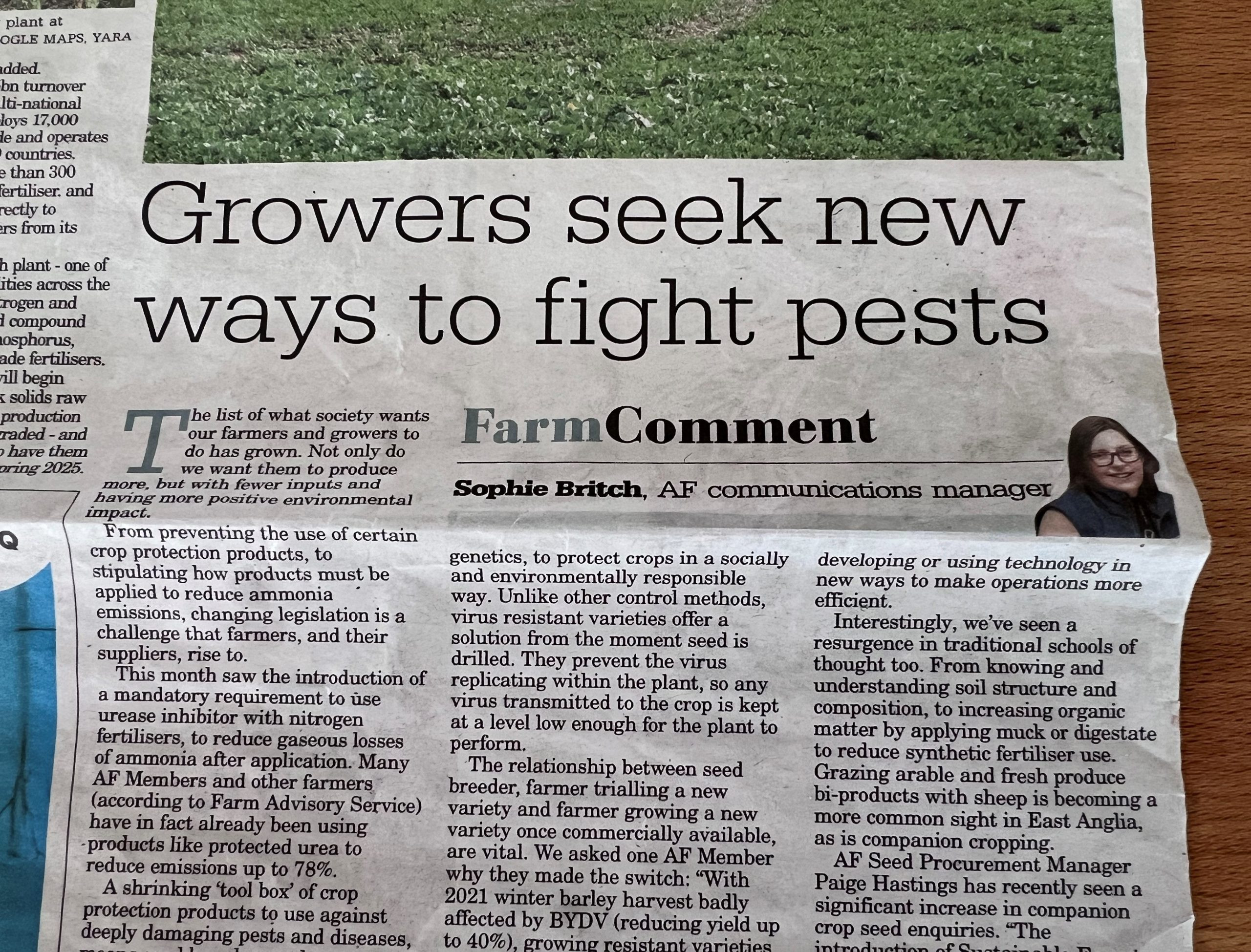News
Growers seek new ways to fight pests
22 April 2024
The list of what society wants our farmers and growers to do has grown. Not only do we want them to produce more, but with fewer inputs and having more positive environmental impact. Sophie Britch, AF Communications Manager, picks out some reasons behind changes in food production.
From preventing the use of certain crop protection products, to stipulating how products must be applied to reduce ammonia emissions, changing legislation is a challenge that farmers, and their suppliers, rise to.
This month saw the introduction of a mandatory requirement to use urease inhibitor with nitrogen fertilisers, to reduce gaseous losses of ammonia after application. Many AF Members and other farmers (according to Farm Advisory Service) have in fact already been using products like protected urea to reduce emissions up to 78%.
A shrinking ‘tool box’ of crop protection products to use against deeply damaging pests and diseases, means seed breeders and growers are revisiting variety traits. Breeding programmes improve yield, quality of produce, agronomic characteristics, resistance to disease and tolerance of weather-related stress. These last two have been subject of increased focus in recent years.
Barley yellow dwarf virus (BYDV) can cause significant yield losses, or even complete crop failure, in cereals. In 2019, neonicotinoid seed treatments providing protection against BYDV were withdrawn, leaving farmers no choice but to treat wheat crops with the single remaining insecticide, pyrethroids.
Seed breeder RAGT believed the solution to this problem lay in genetics, to protect crops in a socially and environmentally responsible way. Unlike other control methods, virus resistant varieties offer a solution from the moment seed is drilled. They prevent the virus replicating within the plant, so any virus transmitted to the crop is kept at a level low enough for the plant to perform.
The relationship between seed breeder, farmer trialling a new variety and farmer growing a new variety once commercially available, are vital. We asked one AF Member why they made the switch: “With 2021 winter barley harvest badly affected by BYDV (reducing yield up to 40%), growing resistant varieties seems common sense, especially if we can reduce insecticide use across the farm.”
Farmers are embracing a huge range of technological advances, designed to ensure they get the right product in the right place at the right time to deliver maximum yield from minimum inputs.
From more efficient fertilisers placed with the seed when its planted (rather than broadcast across the land), crop protection products incorporating chemistry to make them more efficient (so less is applied), to fossil fuel-free tractors and emerging drone technology identifying disease in crops.
Farmers can now even claim what are known as R & D tax credits for developing or using technology in new ways to make operations more efficient.
Interestingly, we’ve seen a resurgence in traditional schools of thought too. From knowing and understanding soil structure and composition, to increasing organic matter by applying muck or digestate to reduce synthetic fertiliser use. Grazing arable and fresh produce bi-products with sheep is becoming a more common sight in East Anglia, as is companion cropping.
AF Seed Procurement Manager Paige Hastings has recently seen a significant increase in companion crop seed enquiries. “The introduction of Sustainable Farming Incentive (SFI) has led to renewed interest in companion cropping, something we’d already seen growing more popular with Members even before SFI.”
How our food is grown affects availability, cost and factors many shoppers use to make purchasing decisions, such as sustainability. Often perceived as a backwards industry relying on excessive levels of synthetic inputs, the reality of farming is that, quietly behind the scenes, farmers are open-minded, progressive and passionate about growing the best they can. As their farm inputs buying co-operative, AF is proud to navigate the evolving landscape of food production with them.
Britch, S. 2024. The evolving landscape of food production. East Anglian Daily Times. 6th April.